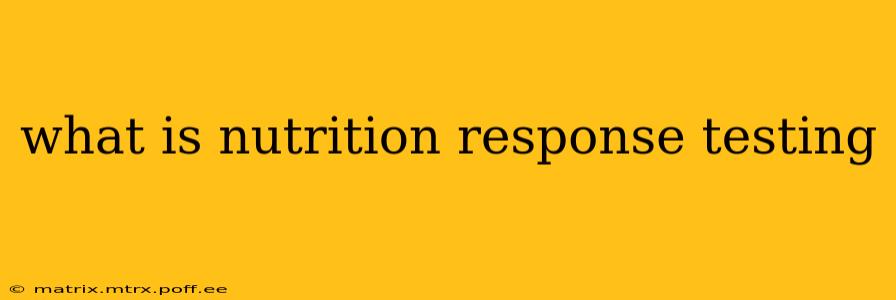Nutrition Response Testing (NRT) is a controversial alternative medicine technique used to identify nutritional deficiencies and imbalances within the body. It's based on the premise that subtle muscle weakness, assessed through applied kinesiology (muscle testing), reflects underlying nutritional needs. Practitioners believe that by testing the strength of specific muscles while the patient is exposed to various nutrients, they can pinpoint areas requiring supplementation.
While proponents claim NRT can identify allergies, sensitivities, and deficiencies, it lacks widespread scientific acceptance and is considered by many mainstream medical professionals to be pseudoscience. The methodology and claims are not supported by robust scientific evidence. It's crucial to understand the limitations and potential downsides before considering this approach.
How Does Nutrition Response Testing Work?
The process typically involves a practitioner applying gentle pressure to a patient's outstretched arm while the patient simultaneously holds a nutrient or substance. A weakened muscle response, according to NRT practitioners, indicates a deficiency or sensitivity to that specific substance. The practitioner then suggests a personalized nutritional plan based on the testing results, often involving supplements.
What are the Claims of Nutrition Response Testing?
NRT practitioners claim that the technique can identify:
- Nutritional deficiencies: Lack of essential vitamins, minerals, and other nutrients.
- Food sensitivities and allergies: Adverse reactions to specific foods.
- Underlying health issues: Links between nutritional imbalances and various health problems.
Does Nutrition Response Testing Really Work? Scientific Evidence and Criticisms
The scientific community largely rejects NRT due to a lack of robust evidence supporting its claims. Key criticisms include:
- Lack of Reproducibility: Studies haven't consistently demonstrated the reproducibility of muscle testing results. The same practitioner might get different results on the same patient on different days.
- Subjectivity: Muscle testing is highly subjective, relying on the practitioner's interpretation of subtle muscle responses. This introduces significant bias.
- No Placebo-Controlled Studies: Rigorous, placebo-controlled studies are needed to eliminate the potential for the placebo effect, which can influence outcomes. Such studies are largely absent.
- Lack of Biological Plausibility: The mechanism by which subtle muscle weakness accurately reflects nutritional deficiencies remains unexplained and lacks a strong biological rationale.
What are the Potential Risks of Nutrition Response Testing?
While NRT itself is generally considered safe (excluding any potential allergic reactions to the tested substances), several potential risks exist:
- Misdiagnosis: Incorrect identification of deficiencies or sensitivities can lead to inappropriate treatment and potentially harmful consequences.
- Financial Burden: NRT often involves expensive supplements that may not be necessary or beneficial.
- Delaying Proper Medical Care: Reliance on NRT could delay seeking appropriate medical attention for actual health problems.
- Unnecessary Supplements: Taking unnecessary supplements can lead to nutrient imbalances and potential interactions with medications.
Is Nutrition Response Testing a Replacement for Conventional Medical Care?
Absolutely not. NRT should not replace conventional medical diagnosis and treatment. It's crucial to consult with a qualified healthcare professional for any health concerns and to discuss any complementary or alternative medicine approaches you're considering. Conventional diagnostic tools and testing methods provide far more reliable and accurate information.
What are the Alternatives to Nutrition Response Testing?
For assessing nutritional status and identifying potential deficiencies, conventional medical approaches offer more reliable methods:
- Blood tests: Measure levels of various nutrients and substances in the blood.
- Urine tests: Analyze the composition of urine to detect certain imbalances.
- Stool tests: Evaluate gut health and nutrient absorption.
Ultimately, while NRT might offer some individuals a sense of empowerment and control over their health, it's essential to approach it with critical thinking and a healthy dose of skepticism. It's critical to prioritize conventional medical advice for accurate diagnosis and treatment of health concerns.
